状语从句的连接词及省略
状语从句归纳总结
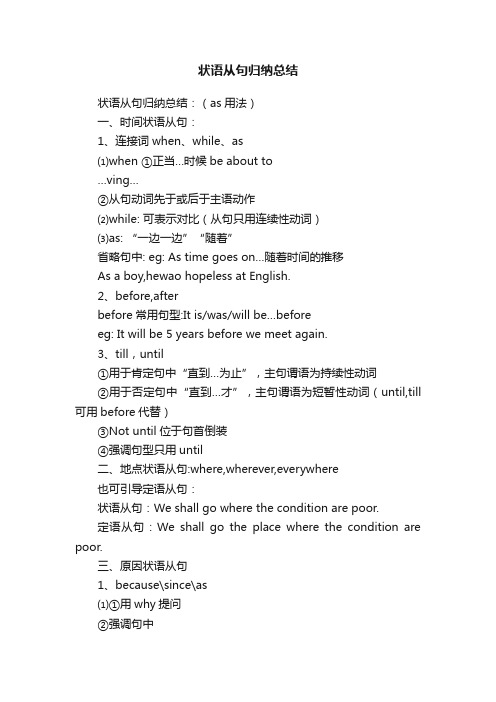
状语从句归纳总结状语从句归纳总结:(as用法)一、时间状语从句:1、连接词when、while、as⑴when ①正当…时候be about to…ving…②从句动词先于或后于主语动作⑵while: 可表示对比(从句只用连续性动词)⑶as: “一边一边”“随着”省略句中: eg: As time goes on…随着时间的推移As a boy,hewao hopeless at English.2、before,afterbefore常用句型:It is/was/will be…beforeeg: It will be 5 years before we meet again.3、till,until①用于肯定句中“直到…为止”,主句谓语为持续性动词②用于否定句中“直到…才”,主句谓语为短暂性动词(until,till 可用before代替)③Not until位于句首倒装④强调句型只用until二、地点状语从句:where,wherever,everywhere也可引导定语从句:状语从句:We shall go where the condition are poor.定语从句:We shall go the place where the condition are poor.三、原因状语从句1、because\since\as⑴①用why提问②强调句中③关联词“not…but”④与“just”等副词连用eg:You shouldn’t any only because you had much.⑵since引导从句常放句首,往往表示对方已知的让步原因关系,主从时态一般相同⑶as从句放句首2、now(that) 既然3、considering that,seeing (that):与since,now that意相近: “鉴于…”“考虑到…”4、not that…,but that…“不是因为…而是因为…”四、目的状语从句1、that,so that,in order that“为了,以便”⑴从句中往往出现情态动词:can\could\may\might⑵当主从句的主语一致时,可转换为相应动词不定式结构:so as to\in order to2、in case,for fear that,lest“以防、以免、万一..”从句是肯定句五、结果状语从句1、so,that,so thatso that可以引导结果状语从句和目的状语从句,区别在于:目的状从中有情动(结果状从前有“,”号)2、so…thatsuch a\an +形+单名=so+形+a\an+单名“如此…以至于”3、such…thatsuch…that(状从)such…as(定从)4、such that (是这样…以致)六、条件状语从句:主句中用一般将来时,从句中用一般现在时或一般过去时1、if正面条件“如果”2、unless. 反面条件=if not 主句为否定意味,从句为肯定句(从句也可用否定结构)unless做介词“除非,如果不”3、so\as long as,on condition that “条件是…”“只要..”4、in case既可引导目的状,又可引导条件状=”if it happened that…”5、providing,provided that, suppsing,suppose (that),given (that) “如果,只要,假如”七、方式状语从句1、as,just as“如…”“正如…一样”Do just as you like2、as if, as though (虚拟语气)八、比较状语从句1、as…as,the same as. 否定句用not so\as…as,not the same as从句中常用省略句: eg:He runs as fast as he can.2、than3、the more…the more…“越…越…”4、more than九、让步状语从句1、although,though.句中不出现but,可出现still\yet(副词)though的位置较灵活,可倒装2、even if,even though“即使”even if表主观,时态往往用于将来even though通常表客观上的,往往表过去事实3、no matter wh…只用于让步状语从句wh..ever 让步状从/名词性从句4、as特殊倒状5、while,whereas突出对比6、if(=even if) 强调部分(n.\adj.\adv.\v.) +as+主+谓(可以是情动)。
状语从句讲义(讲稿)
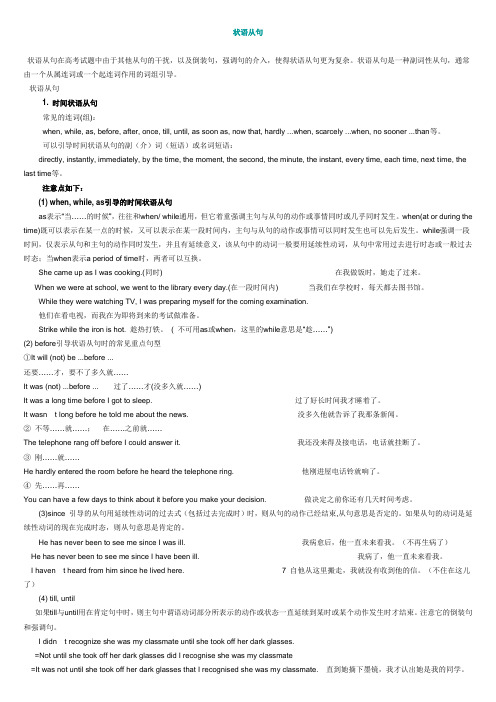
状语从句状语从句在高考试题中由于其他从句的干扰,以及倒装句,强调句的介入,使得状语从句更为复杂。
状语从句是一种副词性从句,通常由一个从属连词或一个起连词作用的词组引导。
状语从句1. 时间状语从句常见的连词(组):when, while, as, before, after, once, till, until, as soon as, now that, hardly ...when, scarcely ...when, no sooner ...than等。
可以引导时间状语从句的副(介)词(短语)或名词短语:directly, instantly, immediately, by the time, the moment, the second, the minute, the instant, every time, each time, next time, the last time等。
注意点如下:(1) when, while, as引导的时间状语从句as表示“当……的时候”,往往和when/ while通用,但它着重强调主句与从句的动作或事情同时或几乎同时发生。
when(at or during the time)既可以表示在某一点的时候,又可以表示在某一段时间内,主句与从句的动作或事情可以同时发生也可以先后发生。
while强调一段时间,仅表示从句和主句的动作同时发生,并且有延续意义,该从句中的动词一般要用延续性动词,从句中常用过去进行时态或一般过去时态;当when表示a period of time时,两者可以互换。
She came up as I was cooking.(同时) 在我做饭时,她走了过来。
When we were at school, we went to the library every day.(在一段时间内) 当我们在学校时,每天都去图书馆。
While they were watching TV, I was preparing myself for the coming examination.他们在看电视,而我在为即将到来的考试做准备。
高中英语,状语从句的技巧-最全

高中英语,状语从句的技巧时间状语从句:1,when引导时,主句和从句的动作可以同时,也可以先后When I was a child ,I used to play football 当我还是一个孩子的时候,我经常踢足球When the movie ended ,all people went back 当电影结束,所有的人都走了2,while引导时,通常表示与。
同时,在。
期间While you were eating ,I was reading 当你在吃东西的时候,我在读书While you were here,he used to visit you 当你在这里的时候,他经常去拜访你3,as引导时,1,表示一件事和另一件事相继发生I went to school as the rain stopped 当雨停下来了,我就去上学了2,在某事进程中,发生另一件事As he was giving us a lecture a man came into the classroom 当他正在做演讲的时候,一个男人走进了教室。
3,表示两个动作同时发生He smiled happily as I wanted to say "hello"to him 当我正要和他说:"你好"的时候,他正开心的微笑着。
Before引导时,I must finish my homework before my father comes back 我必须在我爸爸回来之前完成我的作业。
After引导时,He will call you after you finish your work 在你完成你的工作以后,他会给你打电话的Since引导时,It has been five years since you lived here 自从你住在这里,都已经五年了。
Until/till引导时,1,肯定句时,主句动作发生以后,才到从句的动作I will read books until I understand all of them 我将会阅读这些书,知道我弄懂里面的所有2,否定句时,主句动作发生在从句动作之后I won't finish my work until my father comes back 直到我爸爸回来,我才会完成我的工作3,till 不能用于句首Until I finish my work,I can help 直到我完成我的工作,我才能帮助你4,not。
状语从句的连接词
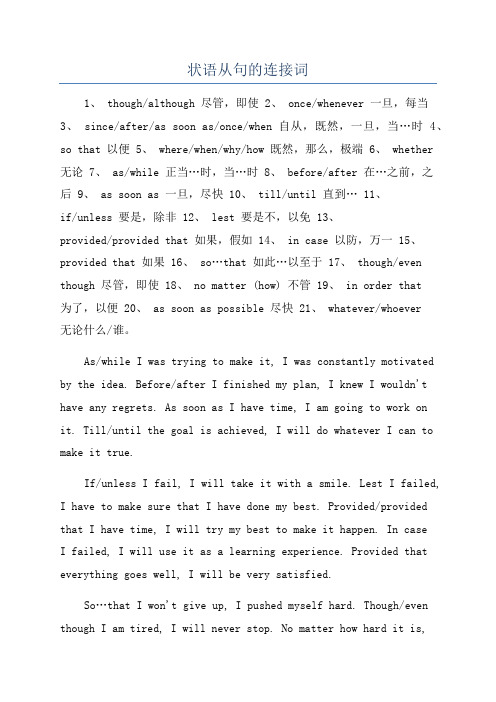
状语从句的连接词1、 though/although 尽管,即使2、 once/whenever 一旦,每当3、 since/after/as soon as/once/when 自从,既然,一旦,当…时4、so that 以便5、 where/when/why/how 既然,那么,极端6、 whether 无论7、 as/while 正当…时,当…时8、 before/after 在…之前,之后 9、 as soon as 一旦,尽快 10、 till/until 直到… 11、if/unless 要是,除非 12、 lest 要是不,以免 13、provided/provided that 如果,假如 14、 in case 以防,万一 15、provided that 如果 16、so…that 如此…以至于 17、 though/even though 尽管,即使 18、 no matter (how) 不管 19、 in order that为了,以便 20、 as soon as possible 尽快 21、 whatever/whoever无论什么/谁。
As/while I was trying to make it, I was constantly motivated by the idea. Before/after I finished my plan, I knew I wouldn't have any regrets. As soon as I have time, I am going to work on it. Till/until the goal is achieved, I will do whatever I can to make it true.If/unless I fail, I will take it with a smile. Lest I failed, I have to make sure that I have done my best. Provided/provided that I have time, I will try my best to make it happen. In caseI failed, I will use it as a learning experience. Provided that everything goes well, I will be very satisfied.So…that I won't give up, I pushed myself hard. Though/even though I am tired, I will never stop. No matter how hard it is,I will keep going. In order that I could reach my goal, I will always remember why I started. As soon as possible, I am going to keep doing what I can. Whatever/whoever stands in the way, I will make it happen.。
状语从句,定语从句、宾语从句的省略

Unit 5
First aid
:什么时候可以省略?怎么省略? 在含有状语从句的复合句中若从句的主句是it或与 主句的主语相同,且在谓语中含有be时,常省略从 句的主语和be。 1._____________________ When/While in Beijing (在北京的时候), I paid a visit to the Summer Palace. When/As a young man 当是个年轻人的时候), 2. ______________________( Abraham Lincoln was a storekeeper and a postmaster. 3. He has no money. ______ If any (要是有的话), he will give us. Unless repaired 除非修理), the machine is of no use. 4._____________( 5. _______________________( If given more attention to 要是给更多的关注), The boy could have turned out better. 6. A girl stood at the gate of the school as if _________ _____________________( talking with a teacher 跟老师讲话).
栏目 导引
Unit 5
First aid
Ⅰ 单句语法填空 ordered 1.Although ___________ (order) to stop, the driver kept on
driving as fast as he could.
最新高考英语复习_时间原因方式地点比较状语从句及省略用法(讲案)(解析版)
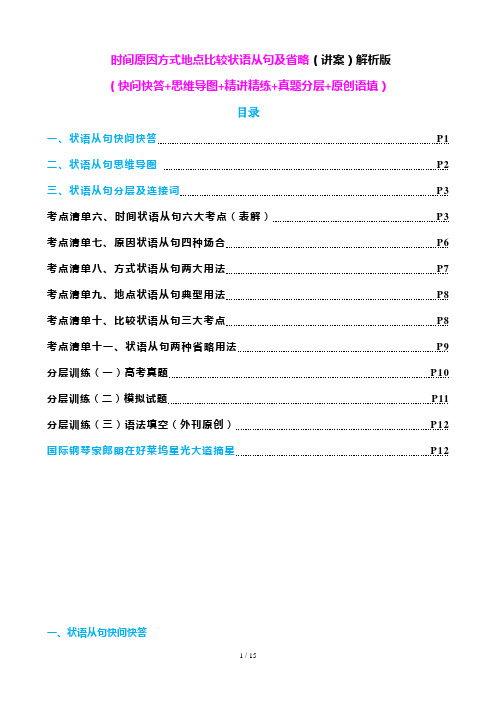
时间原因方式地点比较状语从句及省略(讲案)解析版(快问快答+思维导图+精讲精练+真题分层+原创语填)目录一、状语从句快问快答P1二、状语从句思维导图P2三、状语从句分层及连接词P3 考点清单六、时间状语从句六大考点(表解)P3 考点清单七、原因状语从句四种场合P6 考点清单八、方式状语从句两大用法P7 考点清单九、地点状语从句典型用法P8 考点清单十、比较状语从句三大考点P8 考点清单十一、状语从句两种省略用法P9 分层训练(一)高考真题P10 分层训练(二)模拟试题P11 分层训练(三)语法填空(外刊原创)P12 国际钢琴家郎朗在好莱坞星光大道摘星P12一、状语从句快问快答Q1:什么叫状语从句?A1:顾名思义,状语从句就是一个从句在句中相当于一个副词,表示时间、原因等。
Q2:状语从句分哪九大类型?A2:根据功能,分让步状语从句、条件状语从句、目的状语从句、结果状语从句、时间状语从句、原因状语从句、方式状语从句、地点状语从句、比较状语从句等。
Q3:状语从句连接词有哪些?A3:状语从句连接词根据其具体功能变化而变化,具体参见“考点清单三、状语从句分层及连接词”。
Q4:学习状语从句难点在哪里?A4:一是选择合适的连接词,二是判断从句的类型,三是在写作中如何巧妙运用状语从句提升句子表达力。
Q5:阅读中遇到状语从句怎么办?A5:利用括号法把整个状语从句括起来视为一个整体来理解。
Q6:学好状语从句有什么意义?A6:一能化繁为简迅速提高文章阅读能力,二能在书面表达巧妙运用状语从句提升句子表达效果。
Q7:如何才能学好状语从句?A7:一是努力掌握状语从句基本知识框架,二是加强训练和背诵,积少成多,见多识广。
二、状语从句思维导图三、状语从句分类及连接词考点清单六、时间状语从句六大考点(表解)要点精讲1:“一……就……”多样化表达方式要点精讲2:as, when和while引导的时间状语从句要点精讲3:till和until引导的时间状语从句要点精讲4:after, before引导的时间状语从句①since表示“自从……以来”,引导时间状从,从句谓语用一般过去时,常用于It is+时间段+since…句型;②从句谓语是瞬时性动词,表示字面意思;是延续性动词则表示“自该动作结束以来”。
2状语从句
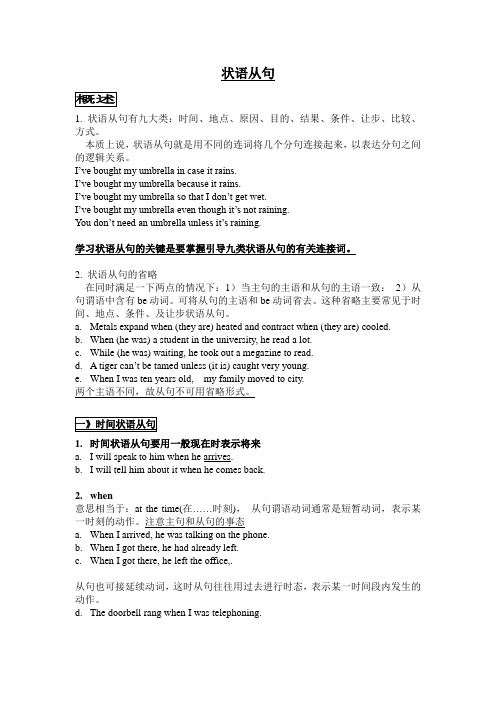
状语从句1. 状语从句有九大类:时间、地点、原因、目的、结果、条件、让步、比较、方式。
本质上说,状语从句就是用不同的连词将几个分句连接起来,以表达分句之间的逻辑关系。
I’ve bought my umbrella in case it rains.I’ve bought my umbrella because it rains.I’ve bought my umbrella so that I don’t get wet.I’ve bought my umbrella even though it’s not raining.You don’t need an umbrella unless it’s raining.学习状语从句的关键是要掌握引导九类状语从句的有关连接词。
2. 状语从句的省略在同时满足一下两点的情况下:1)当主句的主语和从句的主语一致:2)从句谓语中含有be动词。
可将从句的主语和be动词省去。
这种省略主要常见于时间、地点、条件、及让步状语从句。
a.Metals expand when (they are) heated and contract when (they are) cooled.b.When (he was) a student in the university, he read a lot.c.While (he was) waiting, he took out a megazine to read.d. A tiger can’t be tamed unless (it is) caught very young.e.When I was ten years old, my family moved to city.两个主语不同,故从句不可用省略形式。
1.时间状语从句要用一般现在时表示将来a.I will speak to him when he arrives.b.I will tell him about it when he comes back.2.when意思相当于:at the time(在……时刻),从句谓语动词通常是短暂动词,表示某一时刻的动作。
状语从句(9种全)
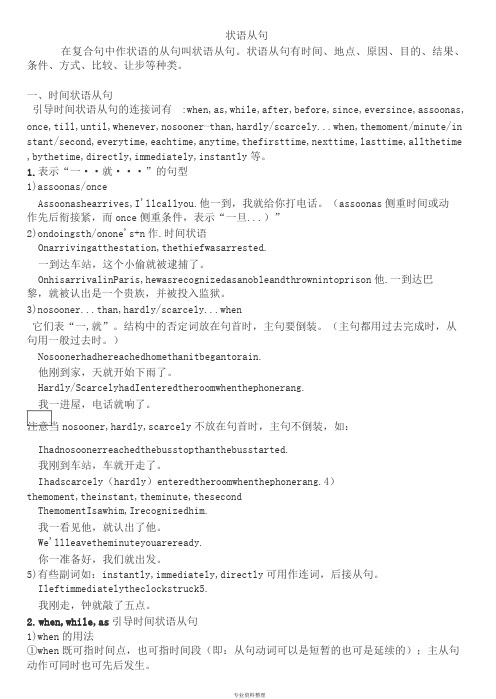
状语从句在复合句中作状语的从句叫状语从句。
状语从句有时间、地点、原因、目的、结果、条件、方式、比较、让步等种类。
一、时间状语从句引导时间状语从句的连接词有:when,as,while,after,before,since,eversince,assoonas, once,till,until,whenever,nosooner⋯than,hardly/scarcely...when,themoment/minute/in stant/second,everytime,eachtime,anytime,thefirsttime,nexttime,lasttime,allthetime ,bythetime,directly,immediately,instantly等。
1.表示“一··就···”的句型1)assoonas/onceAssoonashearrives,I'llcallyou.他一到,我就给你打电话。
(assoonas侧重时间或动作先后衔接紧,而once侧重条件,表示“一旦...)”2)ondoingsth/onone's+n作.时间状语Onarrivingatthestation,thethiefwasarrested.一到达车站,这个小偷就被逮捕了。
OnhisarrivalinParis,hewasrecognizedasanobleandthrownintoprison他.一到达巴黎,就被认出是一个贵族,并被投入监狱。
3)nosooner...than,hardly/scarcely...when它们表“一,就”。
结构中的否定词放在句首时,主句要倒装。
(主句都用过去完成时,从句用一般过去时。
)Nosoonerhadhereachedhomethanitbegantorain.他刚到家,天就开始下雨了。
Hardly/ScarcelyhadIenteredtheroomwhenthephonerang.我一进屋,电话就响了。
- 1、下载文档前请自行甄别文档内容的完整性,平台不提供额外的编辑、内容补充、找答案等附加服务。
- 2、"仅部分预览"的文档,不可在线预览部分如存在完整性等问题,可反馈申请退款(可完整预览的文档不适用该条件!)。
- 3、如文档侵犯您的权益,请联系客服反馈,我们会尽快为您处理(人工客服工作时间:9:00-18:30)。
状语从句连接词
时间状语从句:常用引导词:when, as, while, as soon as, before, after, since , till, until
特殊引导词:the minute, the moment, the second, every time, the day,the instant, immediately , directly, no sooner … than, hardly …when, scarcely … when instantly
地点状语从句:常用引导词:where
特殊引导词:wherever, anywhere, everywhere
Generally, air will be heavily polluted where there are factories.
Wherever you go, you should work hard.
地点状语从句一般由连接副词where, wherever等引导,已经形成了固定的句型:
句型1:Where+地点从句,(there)+主句。
【注意】此句型通常译成“哪里……哪里就……”;主句在从句后面时,there可用可不用;如果主句在从句的前面时,一般都不用there。
例如:
Where there is no rain, farming is difficult or impossible.在没有雨水的地方,耕作是困难的,或根本不可能的。
句型2:Anywhere/ wherever+地点从句,+主句。
【注意】anywhere本身是个副词,但是,常可以引导从句,相当于连词,意思相似于wherever, anywhere引导的从句可位于主句之前,也可以位于主句之后。
而wherever本身就是个连词,表示“在何处,无论何处”。
例如:
Wherever the sea is , you will find seamen.有海就有海员。
原因状语从句:常用引导词:because=in that, since=now that(既然), as, for(补充说明)
特殊引导词:seeing that, now that, in that, considering that, given that(考虑到).
目的状语从句:常用引导词:so that, in order that
特殊引导词:lest, in case, for fear that(唯恐生怕),in the hope that(带着..希望), for the purpose that(带着..目的), to the end that
结果状语从句:常用引导词:so … that, such … that,
特殊引导词:such that, to the degree that, to the extent that, to such a degree that,
条件状语从句:常用引导词:if, unless,
特殊引导词:as/so long as
(只要), only if, providing/provided that(倘若), supposing that (倘若), in case that(以防), on condition that
让步状语从句:常用引导词:though, although, even if, even though (即使)
特殊引导词: as(用在让步状语从句中必须要倒装),while ( 一般用在句首 ),no matter …, in spite of the fact that, while, whatever, whoever, wherever, whenever, however, whichever,as if=as though(仿佛)
比较状语从句:常用引导词:as(同级比较), than(不同程度的比较) 特殊引导词:the more … the more … ; just as …,so…; A is to B what /as X is to Y(A对B来说,像X对Y一样); no … more than; not A so much as B
方式状语从句:常用引导词:as, as if, how
特殊引导词:the way
10. 状语从句的简化
♠状语从句的省略
状语从句同时具备下列两个条件:①主句和从句的主语一致,或从句主语为it;②
从句主要动词是be的某种形式。
从句中的主语和be动词常可省略。
例如:When ( the museum is ) completed , the museum will be open to the public next year .
He’ll go to the seaside for his holiday if (it is ) possible.
另外,比较状语从句经常省略。
例如:
I’m taller than he (is tall ).
The higher the temperature (is), the greater the pressure (is ).
就状语从句而言,有时为了使语言言简意赅,常常将状语从句进行"简化"。
状语从
句的"简化"现象在口语中较为普遍,而且在高考中的复现率也较高。
因此,有必要对其
进行全面、透彻的了解。
状语从句的"简化"现象常存在于以下五种状语从句中:①由if, unless等引导的条
件状语从句;②由although, though, even if / though等引导的让步状语从句;③由when, while, as, before, after, until / till等引导的时间状语从句;④由as, as if等引导的方式状
语从句;⑤由as, than等引导的比较状语从句。
下面针对这五种情形作一归纳。
(1)当状语从句的主语是it,且谓语动词是be时,it和be要完全简化掉。
例如:
If (it is) possible, he will help you out of the difficulty.如果可能的话,他会帮你摆脱困境。
You must attend the meeting unless (it is) inconvenient to you.除非情况对你来说不方便,否则你必须出席这次会议。
(2)当状语从句的主语和主句的主语一致时,从句可以将主语和be动词简化掉。
常用于以下几种情形:
a.连词+形容词
As (he was) young, he learned how to ride a bike.他小时候就学会了骑自行车。
Whenever (she is) free, she often goes shopping.她有空就去逛商店。
Work hard when (you are) young, or you'll regret.少壮不努力,老大徒伤悲。
b.连词+名词
While (he was) a young boy, he was always ready to help others.他在孩提时代就乐于助人。
Although (he was) a farmer, now he is a famous director.尽管他曾是个农民,而现在是位著名的导演了。
c.连词+现在分词
As (she was) walking along the river bank, she was singing a pop song.她沿着河堤边走边唱着流行歌曲。
Although (he is) doing his best in maths these days, he has still got no good marks.尽管近来他一直在学数学,但他仍然没有取得好成绩。
d.连词+过去分词
He won't go there with us unless (he is) invited.除非受到邀请,否则他不会和我们一道去那里。
The concert was a great success than (it was) expected.这场音乐会出乎意料地取得了巨大成功。
e.连词+不定式
He stood up as if (he were) to say something.当时他站起来好像要说什么。
He wouldn't solve the problem even if (he were) to take charge.即使他来负责,他也解决不了这个问题。
f. 连词+介词短语
注意:当从句主语和主句主语不一致时,从句部分要么用完全形式,要么用独立主格结构来表达。
例如:
When the meeting was over, all the people went out of the meeting-room.当会议结束时,人们都走出了会议室。
(=The meeting over,
She looked anxious as though (she was) in trouble.她看上去很焦急,好像遇到了麻烦。
